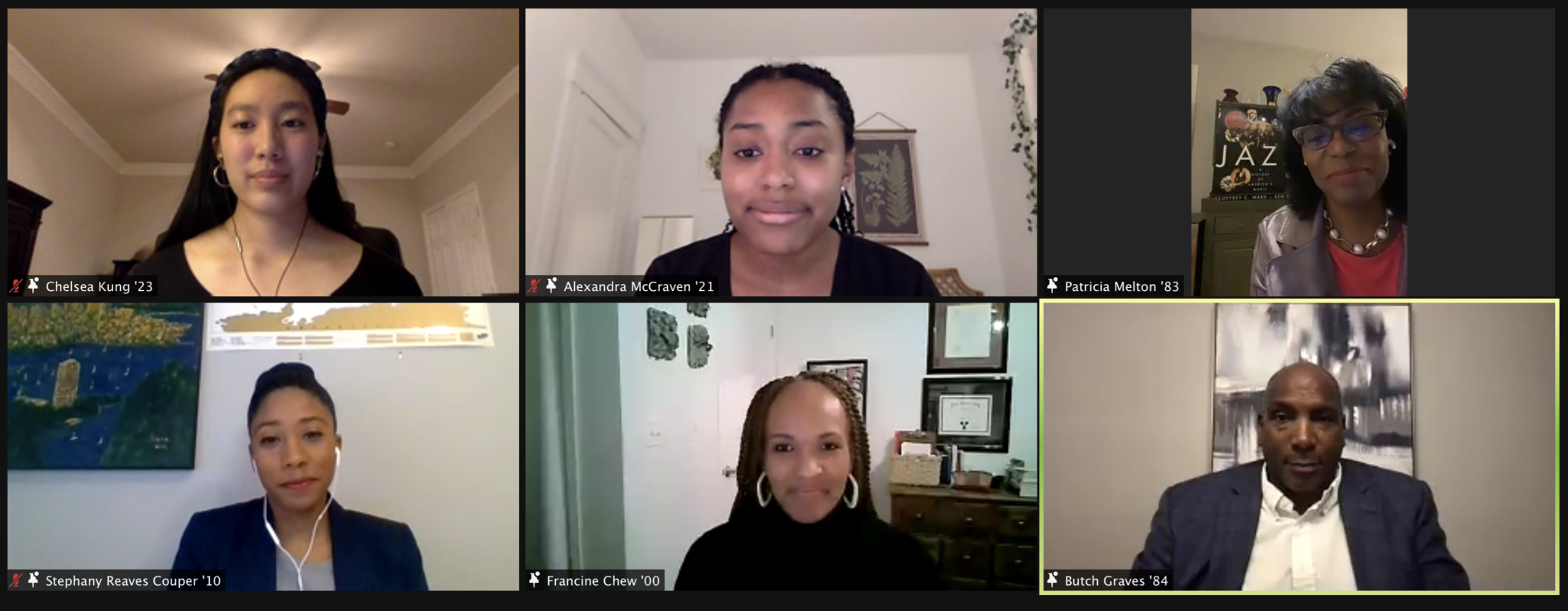“Amplified Voices” panel features reflections from four Black former Yale athletes
The four panelists — Patricia Melton ’83, Earl “Butch” Graves ’84, Francine Chew ’00 and Stephany Reaves Couper ’10 — discussed their experiences as Black athletes at Yale, offered advice to current students and explained how athletics have influenced their attitudes and experiences since graduating from Yale.

Yale Daily News
On Wednesday night, Yale Bulldogs for Change, the Yale Women’s Athletic Network and the Afro-American Cultural Center co-hosted a Zoom panel with four alumni to discuss their experiences as Black student-athletes at Yale.
The panel, which was moderated by women’s soccer defender Alexandra McCraven ’21 and women’s tennis player Chelsea Kung ’23, hosted New Haven Promise President Patricia Melton ’83, public defender Stephany Reaves Couper ’10, Vice President of People Development Capabilities at Prudential Financial, Row New York Board Member Francine Chew ’00 and Black Enterprise CEO Earl “Butch” Graves Jr. ’84.
The discussion ranged from reflecting on their experiences during their time as Black athletes at Yale to offering advice to current students. Each panelist also explained their endeavors following their graduation and how athletics have influenced their attitudes and experiences.
“You would be naive to leave the University and not recognize how fortunate you are to be there, but also to understand that when you go out in the real world it’s going to be much different,” Graves, who played men’s basketball, said. “They’re not going to care about how fast you were … You will be judged … more often times by the color of your skin.”
Graves added that sports are “probably the only thing we do where there’s equity.” He and Chew both noted throughout the panel that sports provided an even playing field for everyone involved in a competition — athletes are judged by performance and statistics regardless of race or other factors.
The four alumni discussed their experience as Black athletes at a predominantly white institution. Couper, who ran track and field, and Melton, who played field hockey before joining the track and field team, said they were both the only Black women on their respective teams at some points. But their experiences were vastly different. While Couper had an “overall positive experience,” Melton ended up leaving the field hockey team after her coach tried to change the position she played, and found her way to the track and field program.
“I had a very negative experience as a field hockey player, and had a falling out with the coach,” Melton added. “There were a lot of issues and challenges around intersectionality.”
Couper and Graves added that they are still friends with many of their teammates and colleagues from their time at Yale. Chew, who rowed at Yale, noted that being an athlete at Yale allows students “to build relationships with folks who are not like you.”
The panelists went on to consider the broader impact of athletics on their lives and their personalities. Some of the four noted how being an athlete allows them to find common ground with other former athletes when entering the workforce or professional schools because it implied a shared work discipline and experiences. Couper shared that she found connecting with other former athletes helpful while interviewing at law firms.
Panelists also reflected on what they would say to younger versions of themselves, most responses fell along the lines of involving themselves with different groups around campus. Chew noted that sports can be “all-consuming” and that she would have liked to find “something else to enjoy.” Graves echoed the sentiment, adding that he “didn’t really open [himself] up to all the things Yale really did offer.”
The conversation later moved towards advice for viewers and reflections on what the four panelists have learned since graduating from Yale. Chew and Graves, who both went on to attend business school, noted the difference in attitude between colleagues who did not participate in sports and those who did.
“I embrace being competitive and wanting to be high achieving and not being ashamed of that, in a way that other female colleagues who were not athletes are not,” Chew said.
Graves also suggested that everyone learn to play golf, especially young women and young Black women. “From a socialization standpoint,” he said, it gives people access to more nuanced happenings that take place away from the workplace.
The conversation concluded with a discussion of the panelists’ work following Yale. Chew emphasized her involvement in Row New York, which she noted was an initiative to help make the sport more inclusive, and Melton spoke about New Haven Promise, which aims to give local students the resources to survive in college and beyond through more than just academics.
Jay Swift ’48 was the first Black athlete to compete at Yale when he played for the men’s basketball team in 1944.
Ángela Pérez | angela.perez@yale.edu








